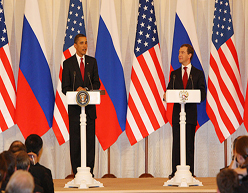Moscow and Washington to cut strategic nuclear arsenal stockpiles and boost bilateral cooperation in other spheres

MOSCOW, Russia — After a protracted stalemate in negotiations that have of recent become serious threat to the existing architecture of contemporary global nuclear security and nuclear capacity parity status between Moscow and Washington, both Russia and the United States have finally signed a new framework agreement that spells out the terms and conditions for reducing their Cold War-era dangerous stockpiles of strategic nuclear arsenals to the lowest level ever agreed up by both Moscow and Washington.
Other key items contained in the framework agreement penned on the first day of U.S. President Barack Obama’s three-day visit to Moscow, include provisions for drastic reductions of both countries’ nuclear arsenals from 2,200 to 1,500-1,675 warheads and from 1,600 to 500-1,100 delivery vehicles. More concrete figures will be reached during subsequent negotiations that are expected to precede the penning of the final agreement before the end of the year, both presidents said at the end of their first day of negotiations in the Kremlin. According to top Kremlin and White House officials, a new legally binding treaty, which is expected to be finally signed later this year, and more importantly, replace the current Strategic Arms Reduction Treaty (START) that expires Dec. 5, 2009, will run for 10 years.
Commenting on the agreement at a press conference in the Kremlin on Monday, Russian President Medvedev called it a reasonable compromise, as the resultant figures will still ensure the existing parity in both countries’ strategic nuclear capability stockpiles in the new START. “These are the new parameters, within which our dialog will be going on and where we hope to achieve a final agreement that will be part of the new treaty.” Equally satisfied with the preliminary START deal with Moscow, Obama noted that without such agreements on their readiness to manage and reduce their own nuclear stockpiles, both the United States and Russia would find it rather difficult to show credible leadership on these issues on the global arena. “This is why we must lead by example, and that’s what we are doing here today.”
Other key issues agreed on by both parties included calls for boosting the level of bilateral cooperation in the nuclear field, military transit to Afghanistan and decision to create a presidential commission on cooperation, which will be coordinating relations among various agencies of the United States and Russia in all priority areas, including economic and military spheres. “I would like to say that I view these agreements as a first, but very important step in the process of improving the full-scale cooperation between our countries, which should benefit both states,” Medvedev said.
P.S.: See the August edition of our print version for more detailed coverage of the visit of U.S. President Barack Obama to Moscow and all the agreements/deals penned during the trip.












 Web design,
Web design,